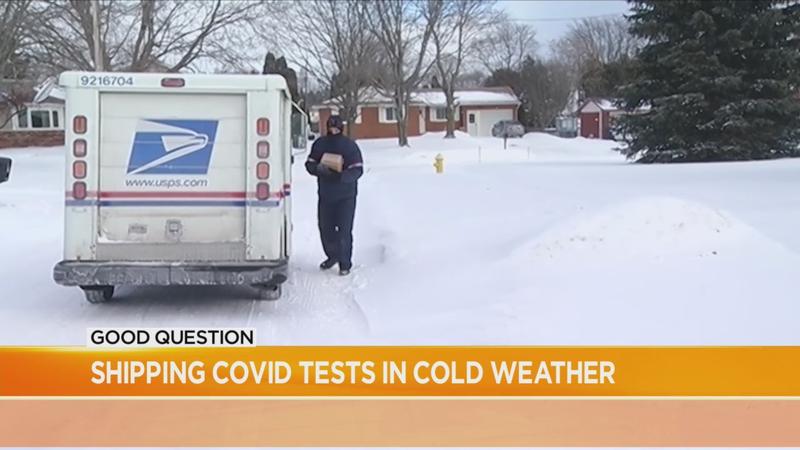Good Question: Will COVID tests work after being delivered in freezing temps?
[anvplayer video=”5084258″ station=”998131″]
ROCHESTER, N.Y. (WHEC) — If you’ve taken COVID tests at home, you probably picked them up at community giveaways or bought at the store and brought them home yourself.
But what about shipping them in the brutal cold this winter?
Anne asked News10NBC’s Brennan Somers: "I was told that COVID tests could not be stored at a freezing temperature. What will happen when those free tests we can start ordering on Wednesday online sit in a mail truck all day then in a freezing mailbox? Will they still have accurate results?
The short version of the answer is yes.
Now here’s the explanation.

Health officials say when it comes to storage and shipping guidelines, that’s all part of what’s reviewed and approved by the FDA when it gives emergency use authorization – like it did for these COVID test kits.
Let’s look at Abbott’s BinaxNOW and Quidel’s QuickVue.
Somers found the federal guidance for both.
For BinaxNOW: Store kits between 35.6 – 86 degrees.
For QuickVue, it’s warmer than others for a baseline minimum. 59 degrees as a low, 86 degrees as a high for the optimum temp range for keeping them at your house.
So what about the time it takes to get a test to your front door?
Abbott told Somers: "A storage temperature range is very common in OTC health products. For BinaxNOW, it’s between 35.6 and 86° F and the test should be kept within this range. But if the test is stored outside the temperature range for a relatively short period of time – for a couple of hours up to a day or two – it will be fine to use, and it’s important is that test and its components be used at room temperature."
The QuickVue maker says: "Quidel has performed studies that demonstrate the product performs as expected under different temperature conditions (i.e., heated and frozen conditions) encountered during shipping."
There’s also iHealth’s rapid antigen test. That’s been handed out a lot locally.
The company says kits need to stay between 36 and 86 degrees, adding, "Any extended exposure of the test kit to temperatures beyond this range may affect quality of test results. If you have ordered home delivery of the test kit and expect temperatures in your area to be outside of this range at time of delivery, it is recommended that you arrange for someone to be home at or near time of delivery to receive the test kit."
The bottom line?
While the specific recommendations for storage can vary by brand, in general, these companies say shipping in winter or whatever extreme conditions have been planned for and in all likelihood the tests will be fine.
The real thing to remember is let the test get to room temperature before you take it, be sure to follow all the directions, and also double check the expiration dates.